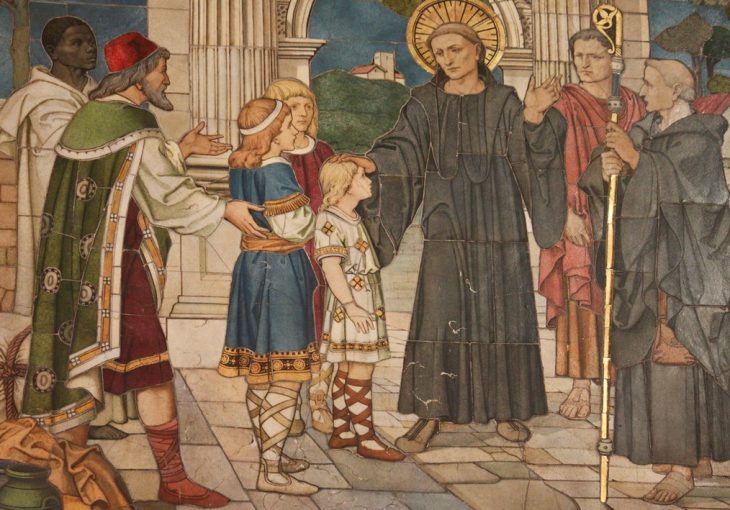
Word of the Day Angel
Today’s word of the day, courtesy of the Old English Wordhord, is angel, though on the Wordhord website it is actually engel. An angel is, of course, a spiritual being, one of God’s army or one of His messengers. But it has undergone broadening, which we talked about last week, to mean anyone or even an animal who does something good for someone or is even just very nice or sweet or attractive. And more recently it has come to refer to a wealthy person who provides financial backing to a start up or an inventor, and from that has even become a verb.
The modern English angel is a “a c. 1300 fusion of Old English engel (with hard -g-) and Old French angele. Both are from Late Latin angelus, from Greek angelos, literally ‘messenger, envoy, one that announces,’ in the New Testament ‘divine messenger,’ which is possibly related to angaros ‘mounted courier,’ both from an unknown Oriental word (Watkins compares Sanskrit ajira– ‘swift;’ Klein suggests Semitic sources)” (https://www.etymonline.com/search?q=angel). Etymonline continues, “The Greek word was used in Scriptural translations for Hebrew mal’akh (yehowah) ‘messenger (of Jehovah),’ from base l-‘-k ‘to send.’ An Old English word for it was aerendgast, literally ‘errand-spirit.’” One should easily recognize the OE gast as ModE ghost.
Etymonline also says this about the broadening of the word’s meaning: “Of persons, ‘one who is loving, gracious, or lovely,’ by 1590s,” so the broadening happened a bit early on in the word’s history. Further, “The medieval English gold coin (a new issue of the noble, first struck 1465 by Edward IV) was so called for the image of archangel Michael slaying the dragon, which was stamped on it. It was the coin given to patients who had been ‘touched’ for the King’s Evil. Angel food cake is from 1881; angel dust ‘phencyclidine’ is from 1968.
Given that the Old English word is engel, one might wonder if England actually means “land of angels,” but that would be a mistake. However, if you noticed the similarity between the two, you wouldn’t be the first one.
In 410 CE, the Roman legions in what today is England were recalled to Rome; the Empire was falling apart and endangered by foreign enemies. They left behind the Celts, often referred to as Romanized Celts, and these Celts were faced with their own enemies, the Picts and the Scots. One of these Celtic warlords, Vortigern, the King of the Britons, invited a couple of Germanic leaders, Hengist and Horsa, to come to Britain to help him deal with the problem, according to the 6th century historian Gildas. They soon invited friends, and before long these Germanic tribes, the Angles, the Saxons, and the Jutes, had taken over modern-day England, or at least a large portion of it.
Bede then tells a story about some of these Anglo-Saxon boys being sold in a slave market in Rome around the year 580, before Gregory the Great became Pope. Here’s a translation of the tale, written in Latin in the Ecclesiastical History of the English People:
It is said that one day, when some merchants had lately arrived at Rome, many things were exposed for sale in the market place, and much people resorted thither to buy: Gregory himself went with the rest, and saw among other wares some boys put up for sale, of fair complexion, with pleasing countenances, and very beautiful hair. When he beheld them, he asked, it is said, from what region or country they were brought? and was told, from the island of Britain, and that the inhabitants were like that in appearance. He again inquired whether those islanders were Christians, or still involved in the errors of paganism, and was informed that they were pagans. Then fetching a deep sigh from the bottom of his heart, “Alas! what pity,” said he, “that the author of darkness should own men of such fair countenances; and that with such grace of outward form, their minds should be void of inward grace.” He therefore again asked, what was the name of that nation? and was answered, that they were called Angles. “Right,” said he, “for they have an angelic face, and it is meet that such should be co-heirs with the Angels in heaven. What is the name of the province from which they are brought?” It was replied, that the natives of that province were called Deiri. “Truly are they De ira,” said he, “saved from wrath, and called to the mercy of Christ. How is the king of that province called?” They told him his name was Aelli and he, playing upon the name, said, “Allelujah, the praise of God the Creator must be sung in those parts.”
Some versions of the story say that Gregory was told that they are Anglos, angli in Latin, and he said, “angeli non angli,” which translates to something like, “not Angles but angels.” Apparently he spoke to the pope at the time, St. Valian, about sending a mission to these Anglo-Saxons, but it wasn’t until he himself was pope that he sent Augustine to the English (not Augustine of Hippo). I’m not sure what makes Gregory a saint or “the Great,” but he sure was good at punning.
I found today’s image on Flickr of St. Gregory and the Anglo slave boys. I don’t really pay attention to Flickr, but from what I can tell, I should thank Lawrence OP for the photograph.